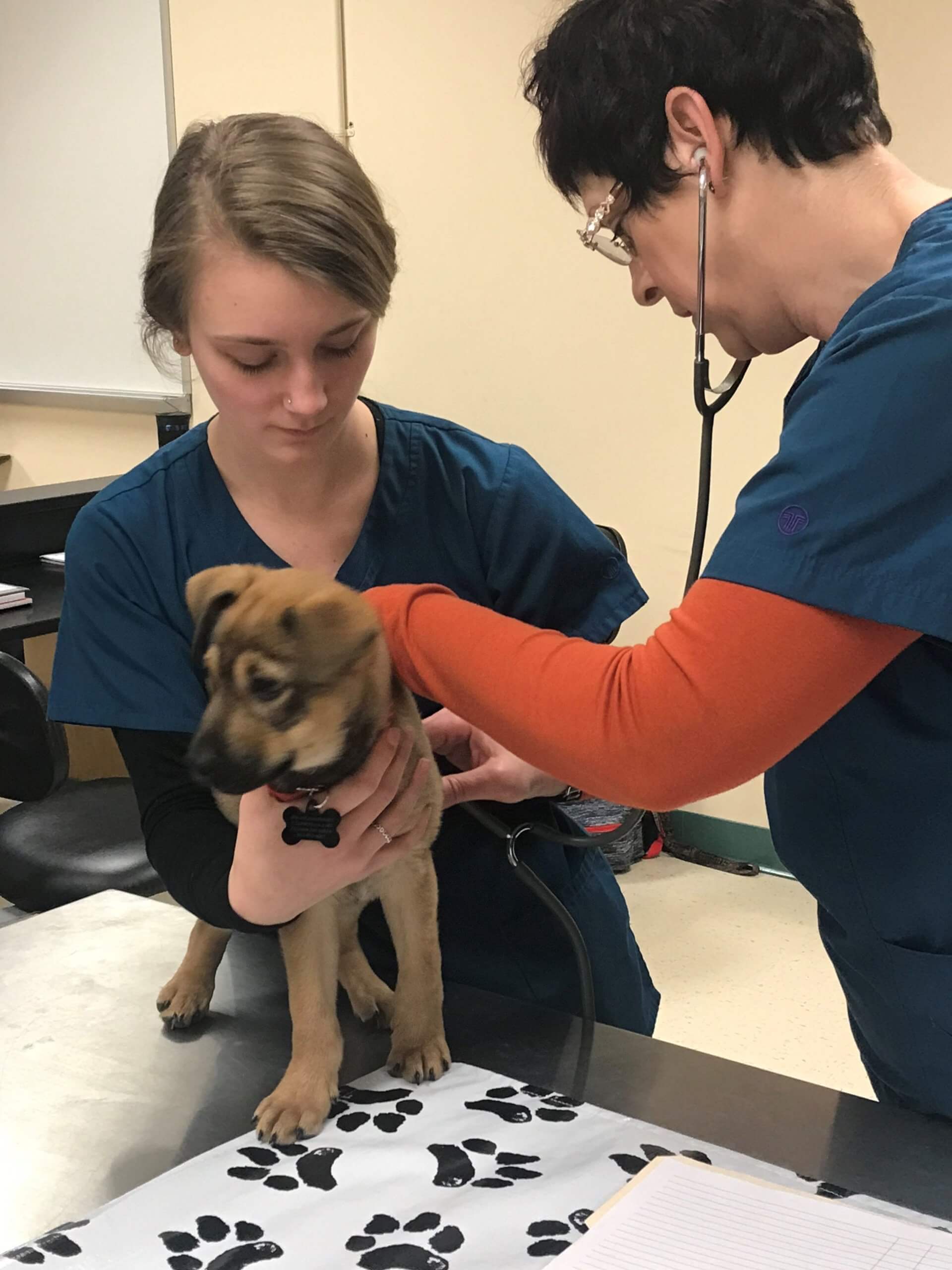Overview
WMCC VET Assistant Program Overview
The Veterinary Assistant certificate provides training in veterinary health and handling of a variety of domestic and exotic species. It focuses on tasks for assisting the Veterinary Technician and Veterinarian. Veterinary Assistants care for animals in veterinary hospitals, animal shelters, and laboratories. They help to maintain a clean and safe work environment and perform various tasks under the supervision of veterinarians, veterinary technicians, and scientists. This certificate covers the essential knowledge and job skills needed, including diagnostics, nutrition, critical care, animal husbandry, surgical assistance, and monitoring. Students experience hands-on learning in the classroom and during the required internship. Veterinary Assistants do not diagnose animal illnesses, prescribe treatment, or perform surgery. This certificate introduces students to the field of veterinary medicine; it is not a veterinary technician program, nor is it intended to provide admission to a college of veterinary medicine. Students who wish to continue their education as a veterinary technician may use courses in this program to fulfill some of the first-year courses of Great Bay Community College’s Veterinary Technician program.
WMCC Veterinary Assistant Program Infographic
WMCC Veterinary Assistant Pathways
This program is available at WMCC’s Berlin campus.
Admission Requirements
- Submit an application for the program
- Meet college requirements for admission
- Possess high school diploma or GED and submit official transcripts to WMCC
- Attend a mandatory information session prior to the beginning of classes.
Applications are not complete until all the above-mentioned documents have been received. Courses begin each Fall semester. It is recommended that students apply early to increase the chance of being accepted into the program, as enrollment is limited.
Upon admission, students will receive a packet of program information with details regarding program requirements. A mandatory information session must be attended prior to proceeding with registration for courses.
Once admitted, the following is required:
- Attendance at a program information session
- Attendance at college orientation
- Proof of a physical examination with current tetanus immunization
- Proof of health insurance
- Criminal background check and drug screening
- Purchase of course materials
All students enrolled in the Veterinary Assistant program must maintain a C+ or above in all courses and have a 90% or better attendance record. They must also comply with the program’s stated standard of professionalism.
The following technical standards provide guidance to students regarding the skills and abilities necessary for them to function successfully in the program and ultimately in the veterinary medical profession. Applicants who think they may not be able to meet one or more of the technical standards must contact the Program Coordinator to discuss individual cases. Students must have:
- Adequate strength and motor coordination to perform the following physical activities: Operating and handling equipment, restraining, moving and transferring patients
- Adequate hearing to assess patient needs and to understand instructions, emergency signals, and telephone conversations.
- Adequate visual acuity to observe patients, manipulate equipment, interpret data, ensure a safe environment, and read fine print/writing and calibrations.
- Adequate speech and language ability to express, comprehend, and exchange information and ideas verbally and non-verbally. Adequate speech and language ability to interact clearly and logically with clients, family members, peers, and other medical personnel.
- Ability to work with frequent interruptions, to respond appropriately in emergencies or unexpected situations, and to cope with variations in workload and stress levels. Ability to maintain a calm demeanor in stressful situations and to handle patients calmly and with compassion.
- Ability to maintain mature, effective relationships with clients, students, faculty, staff, and other professionals under all circumstances.
- Ability to understand instructions, emergency signals, and telephone conversations.
- Ability to act with professionalism and emotional stability and to exercise sound judgment and accept directions and guidance from supervisors or faculty members.
- Ability to maintain confidentiality of client/patient information.
Follow the WMCC Veterinary Assistant program on Facebook.
| Fall Semester | Lec | Lab | Cr | |
| VETA110W | Introduction to Veterinary Technology | 2 | 0 | 2 |
| VETA121W | Veterinary Clinical Methods I | 3 | 3 | 4 |
| VETA226W | Small Animal Behavior | 2 | 0 | 2 |
| Semester Total | 7 | 3 | 8 | |
| Spring Semester | ||||
| VETA114W | Veterinary Pharmacology | 2 | 2 | 3 |
| VETA115W | Veterinary Parasitology | 2 | 0 | 2 |
| VETA116W | Introduction to Veterinary Surgical Assistant | 1 | 2 | 2 |
| Semester Total | 5 | 4 | 7 | |
| Spring Semester | ||||
| VETA111W | Veterinary Assistant Clinical | 1 | 8 | 4 |
| Semester Total | 1 | 8 | 4 | |
| Certificate Total | 19 | |||
Program Outcomes
Upon successful completion of this program, graduates will be prepared to:
- Demonstrate effective client communication skills while demonstrating
professional conduct and using appropriate veterinary medical terminology. - Perform front desk duties such as using veterinary practice management
software to schedule appointments, answer basic client questions, create,
retrieve and file medical records, admit and discharge patients, properly obtain
and record consent forms and consistently demonstrate ethical conduct. - Identify the normal anatomy and common pathologies for common domestic species and each
body system and incorporate critical thinking skills when collecting patient data
and performing patient care. - Identify potential zoonotic diseases and appropriate isolation and disinfection
procedures. - Demonstrate knowledge of hazardous waste handling and of OSHA regulations
and current drug enforcement laws. - Perform basic procedures such as recording of vital signs and basic grooming
techniques. - Prepare patients and assist the veterinary technician or veterinarian with proper
patient restraint for examination, procedures or diagnostic imaging. - Demonstrate knowledge of basic animal behavior and the Human-Animal bond
- Provide basic nursing to sick or surgical patients.
- Perform maintenance of hospital equipment such as radiology equipment,
surgical and sterilizing equipment, laboratory devices and treatment area
equipment. - Collect and prepare laboratory specimens, as well as perform basic laboratory
tests. - Prepare and administer parenteral and oral medications.
- Perform all duties within the Veterinary Assistant scope of practice.
- Appreciate diversity, differing beliefs, value systems, and individual opinions.
- Demonstrate the cognitive, psychomotor skills, and affective competencies qualifying the student to take the CVA (Certified Veterinary Assistant) Exam through American Allied Health.
19 Credits Required
of students qualify for financial aid


